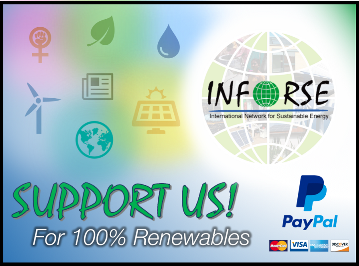|
|
|
|
|
|
|
|
|
|
|
|
|
|
|
|
|
|
|
|
|
| Follow Us: |
| EU's Changing Rules | |
| Renewables Directive on Its Way | |
|
The EU directive for renewable energy in the internal energy market is still under preparation by the EU Commission. The proposal from the EU Commission is expected in May. In December, 1999, the EU Commissioner for energy presented a discussion paper on the issue to the EU Energy Ministers. In this paper, it was proposed that countries should open their markets to imported renewable energy. The exception would be that countries whose electricity demand is covered at more than 5% by renewable energy (RE) witstate support could stop imports of renewable energy from countries with less than 5% coverage by supported RE for 10 years. It was also suggested that ceilings be set for the levels of subsidies allowed for renewable energy. Several NGOs have agreed upon common recommendations for the new directive, and for other elements of EU’s energy policy. An important point of the NGO statement is that no country should be forced to open its renewable-energy market to competition from imports as long as no agreement exists among the EU countries on how to share the common targets for renewable energy. Further, the statement emphasises that any directive must produce real improvements for development of renewable energies. The NGO proposals are supported by Greenpeace, the WWF, the Climate Network Europe, the European Renewable Energy Federation, and several others. The EU Parliament is also planning to present its views on the coming renewable-energy directive before May. Further information: INFORSE-Europe homepage, www.orgve.dk/inforse-europe/, or EREF, att. Dörthe Fouquet, e-mail: 106425.57@compuserve.com. |
|
| Coming Guidelines: A Threat to Renewables? | |
|
The EU Commission has postponed implementation of its new guidelines for state aid for environmental protection from January to July this year. These guidelines are used by the Commission in the notification procedure associated with its monitoring of new national laws. With this procedure, the Commission can stop a new law in an EU country if this law does not follow the guidelines. The guidelines are adopted by the EU Commission without any means of intervention by the EU Parliament or by the EU countries (council of ministers). Without public participation or public hearings in the formulation of the guidelines, no drafts or proposals are publicly available before they are adopted by the Commission. When they are adopted by the Commission, they enters into force. The significance of the guidelines for renewable energy and energy efficiency is that they limit the ways in which EU countries may support development and market introduction of renewable energy and increased energy efficiency. In addition to limiting subsidies from the state budget, the guidelines increasingly are being used to limit all kinds of state-regulated payments and prices for renewable energy, e.g., feed-in laws for renewable electricity, establishment of state-regulated markets for renewable energy, reimbursement of CO2 tax to renewable energy producers, etc. Among other concerns, the fear is that the new guidelines will limit the allowed periods of state aid for a given purpose to, e.g., six years. Combined with the very broad definition of state aid, this would put renewable energy at a serious disadvantage compared with other energy sources, which are subsidized according to various other state-aid guidelines and regimes. The EU Parliament has decided to express its view to the Commission on the new guidelines, in spite of its lack of formal leverage on the issue. Probably, several NGOs and several EU countries will also express their concern to the Commission on the potentially devastating effects of the new guidelines. |
|

| |
| Published in Sustainable Energy News |
|
|
Go back to main page of ISSUE #28 (981KB) 20 pages (2000-02-28) |
|
| Contact | |
| |
INFORSE Secretariat Klosterport 4F, 1. floor DK-8000 Aarhus C Denmark Phone: +45 86 22 70 00 Twitter: INFORSE_org Facebook: INFORSE Web: inforse.org E-mail: ove@inforse.org |
